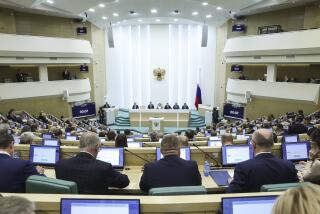The Germ of a Very Bad Idea : Russia confirms the existence of biological warfare research
- Share via
Western suspicions that Russia has continued to pursue a biological warfare program despite a 20-year-old promise to stop have now been confirmed by President Boris N. Yeltsin’s government.
Only last month the Defense Ministry in Moscow branded as “absolute lies” concerns expressed in Washington and London that secret germ weapons work was still under way, asserting that none had been carried out since 1975. That was three years after the Soviet Union joined with more than 40 other nations in a convention to outlaw biological and toxic weapons. Now the Russian government concedes that germ warfare research went on until March of this year. A lot of Americans might be asking how much longer it might have secretly continued had not Western leaders publicly raised the issue of Russian violations of the 1972 convention.
A new Russian-U.S.-British understanding is now expected to bring about the inspection and verification procedures at Russian facilities that were not provided for in the convention, an omission--as events so unmistakably came to show--that made the agreement unenforceable. Western inspectors are to be given full access to the 20 or more sites where research, production or storage of banned materials has been taking place. The Russians say they will cut spending on these facilities. Left unclear is what the scope of any ongoing Russian program would be--for example, in working on antidotes to toxins. U.S. and British laboratories that are similarly working on defenses against biological weapons would be reciprocally open to Russian inspection. Western production of offensive biological weapons ended in the 1970s.
Biological weapons are among the hardest to defend against and are highly feared for the level of threat they present. Specific toxins can almost instantly kill people, fatally infect livestock or destroy crops. Anthrax and plague are among the infecting agents that have been worked on. The new agreement for inspection of Russian facilities is welcome. The chilling question that is now inevitably raised is what may be going on in secret laboratories elsewhere in the world.
More to Read
Sign up for Essential California
The most important California stories and recommendations in your inbox every morning.
You may occasionally receive promotional content from the Los Angeles Times.










